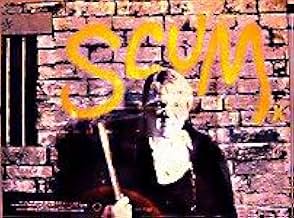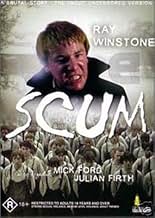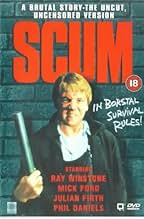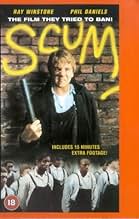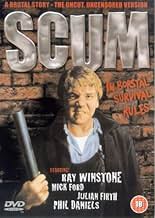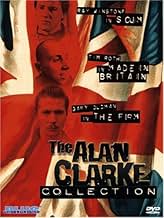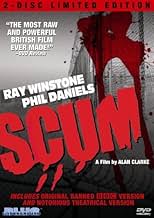CALIFICACIÓN DE IMDb
7.5/10
14 k
TU CALIFICACIÓN
Una historia intransigente de la vida en una institución británica para delincuentes juveniles en los años 70.Una historia intransigente de la vida en una institución británica para delincuentes juveniles en los años 70.Una historia intransigente de la vida en una institución británica para delincuentes juveniles en los años 70.
- Dirección
- Guionista
- Elenco
Philip DaCosta
- Jackson
- (as Philip Da Costa)
- Dirección
- Guionista
- Todo el elenco y el equipo
- Producción, taquilla y más en IMDbPro
Opiniones destacadas
The grandaddy of 'incarceration' films - this is one of the best, oft copied but never bettered.
I liked it because it's so damn British. The one liners are legion; you all know what they are and where, but among a stellar list 'Mecca, Archer' rises just above and never fails to have me in fits. The way Goodyear looks at the Governor just after this great outburst is also revealing; as is the look of satisfaction on Archer's face when he finally succeeds in riling the 'religious maniac'.
Of course, there's a serious message in here; expedited best in the conversation between Archer and Mr Duke over 'coffee'. Analysing the situation, as Archer attempts to do, will simply not be tolerated and is interpreted as dissent by a man who embodies the 'system' and is intellectually and emotionally unequipped to deal with his own, and the State's ultimate failure to deliver.
Like true class acts, this film works on several levels; it's a no nonsense drama bedecked with Taj Mahal one liners everyone loves, yet it also works on a deeper level; you cannot punitively 'correct' all offenders with violence and cruelty. You are not corrected, you are merely broken, as Davis and Toyne are. If you're not broken, you run amok, but the point is you're not 'cured'.
When this film was on TV in 1983, just after Channel Four started broadcasting, they edited the notorious potting shed sequence to such an extent that the heinous act committed was virtually excised, thereby diluting the dramatic effect to virtually zero. Interestingly enough, they also edited out the bit where Mr Greaves ignores Davis' second press of the bell. Why? Presumably because they feared the ire of the State at the highlighting of its inadequacies? I suppose they can be forgiven, Channel Four was new then after all, but it's quite revealing nonetheless.
If I'm home alone, I quote this film as I'm wandering around the house. I don't quite know why. It's all about the importance of individuality, standing up for yourself and not just 'accepting' things. That's probably the reason. Now, where's your tool?
I liked it because it's so damn British. The one liners are legion; you all know what they are and where, but among a stellar list 'Mecca, Archer' rises just above and never fails to have me in fits. The way Goodyear looks at the Governor just after this great outburst is also revealing; as is the look of satisfaction on Archer's face when he finally succeeds in riling the 'religious maniac'.
Of course, there's a serious message in here; expedited best in the conversation between Archer and Mr Duke over 'coffee'. Analysing the situation, as Archer attempts to do, will simply not be tolerated and is interpreted as dissent by a man who embodies the 'system' and is intellectually and emotionally unequipped to deal with his own, and the State's ultimate failure to deliver.
Like true class acts, this film works on several levels; it's a no nonsense drama bedecked with Taj Mahal one liners everyone loves, yet it also works on a deeper level; you cannot punitively 'correct' all offenders with violence and cruelty. You are not corrected, you are merely broken, as Davis and Toyne are. If you're not broken, you run amok, but the point is you're not 'cured'.
When this film was on TV in 1983, just after Channel Four started broadcasting, they edited the notorious potting shed sequence to such an extent that the heinous act committed was virtually excised, thereby diluting the dramatic effect to virtually zero. Interestingly enough, they also edited out the bit where Mr Greaves ignores Davis' second press of the bell. Why? Presumably because they feared the ire of the State at the highlighting of its inadequacies? I suppose they can be forgiven, Channel Four was new then after all, but it's quite revealing nonetheless.
If I'm home alone, I quote this film as I'm wandering around the house. I don't quite know why. It's all about the importance of individuality, standing up for yourself and not just 'accepting' things. That's probably the reason. Now, where's your tool?
I've now seen this movie several times, although admittedly watching it can hardly be classed as a 'pleasure'. Alan Clarke made this feature after his TV play from two years earlier was banned, and perhaps had more freedom here to explore the issues.
Carlin (an early, showy appearance from Ray Winstone) is sent to Borstal where he quickly establishes himself as a tough boy with a regime of strength. Typical Winstone performance in many ways. In the prison with him are his shadow Richards (played by Phil Daniels); cynical, bare-footed Archer (Mick Ford, these days more often seen the other side of the law in such dramas as 'Silent Witness'); black inmate Angel (Davidson Knight); and quiet Davis, the boy who gets picked on for being a loner (a quite staggering performance from Julian Firth, who never really lived up to this early promise).
Scum is uncompromising - violent (there's a rape which leaves little to the imagination, a suicide, several fights); scathing in its condemnation of the 'system' (which thankfully is not like this now) - and yet finds time for character development and convincing plot. Without any music it is purely presented in documentary style, matter-of-fact 'this is how it is'.
Not a fun movie, but one which tries to make a point, and, if nothing else, has the power to shock and make you remember certain sections for a long time after viewing. Recommended.
Carlin (an early, showy appearance from Ray Winstone) is sent to Borstal where he quickly establishes himself as a tough boy with a regime of strength. Typical Winstone performance in many ways. In the prison with him are his shadow Richards (played by Phil Daniels); cynical, bare-footed Archer (Mick Ford, these days more often seen the other side of the law in such dramas as 'Silent Witness'); black inmate Angel (Davidson Knight); and quiet Davis, the boy who gets picked on for being a loner (a quite staggering performance from Julian Firth, who never really lived up to this early promise).
Scum is uncompromising - violent (there's a rape which leaves little to the imagination, a suicide, several fights); scathing in its condemnation of the 'system' (which thankfully is not like this now) - and yet finds time for character development and convincing plot. Without any music it is purely presented in documentary style, matter-of-fact 'this is how it is'.
Not a fun movie, but one which tries to make a point, and, if nothing else, has the power to shock and make you remember certain sections for a long time after viewing. Recommended.
I'd had the opportunity to watch Scum a long time before I actually did, and I was always turned off it by the very sensationalist box and taglines. I've never been a fan of "The film they tried to ban" and similar phrases being used as advertisement for a film, so when I sat down to watch the film today I was very surprised.
It doesn't need phrases like that to advertise it - it's bleak and horrific, and should be advertised as a serious drama rather than some kind of exciting gore-fest. As well as being powerful and thought provoking, it's gripping too, and you won't feel bored when watching it. Although there is a lot of stuff crammed in there, and some scenes are very prolonged, at just over and hour and a half it's the perfect length to achieve what it sets out to do. This is one film you won't be bored watching.
I'm actually surprised that this film doesn't have more of a recognition or following nowadays, and isn't seen in the last light as Kubrick's "A Clockwork Orange" and Lindsay Anderson's "If...".
It doesn't need phrases like that to advertise it - it's bleak and horrific, and should be advertised as a serious drama rather than some kind of exciting gore-fest. As well as being powerful and thought provoking, it's gripping too, and you won't feel bored when watching it. Although there is a lot of stuff crammed in there, and some scenes are very prolonged, at just over and hour and a half it's the perfect length to achieve what it sets out to do. This is one film you won't be bored watching.
I'm actually surprised that this film doesn't have more of a recognition or following nowadays, and isn't seen in the last light as Kubrick's "A Clockwork Orange" and Lindsay Anderson's "If...".
The story on which Scum is based was originally penned to be a part of a BBC series 'Play For Today' but was not shown at the time. It was made into a film two years later by Alan Clarke; and the reason it was not shown earlier is clear to see; as Scum is a shocking and unflinching account of life in Britain's now defunct Borstal system. The film is gritty and realistic and features no shortage of violence, so it's hardly a surprise that it didn't go down particularly well with Britain's conservative film censors. The film revolves around a young offender's institution in Britain. The place is shook up upon the arrival of a young man named Carlin. Carlin was moved from another institution for fighting with a guard, and arrives with his reputation already in front of him. He soon finds out how the prison works and quickly seeks to take out "the daddy" and his cronies to take control of the place himself.
Ray Winstone would go on to have a good career playing hard man types; and this is where it all started. The actor has a much younger look about him than the grizzled actor many will know better; but he still fits the bill well here and is always believable in his role. The film also features a number of faces that will be familiar to anyone who knows anything about British TV. Scum doesn't just rely on violence to deliver its shocks; the whole atmosphere of the central location is thoroughly grim and the guards' attitude towards the inmates does not inspire confidence in the system that the film is portraying. The film does not generally directly expose the flaws of the prison system; although this is given some attention by way of Mick Ford's Archer character; that cleverly condemns the system through dialogue. The story runs smoothly for the first two thirds of the film, while the final third is dedicated to the film's most shocking scenario; a sequence of events that is most likely, from anything in the film, to stay with the viewer once the film is over. Overall, this is an excellent little film that deserves to be viewed by anyone that considers themselves a fan of wayward cinema.
Ray Winstone would go on to have a good career playing hard man types; and this is where it all started. The actor has a much younger look about him than the grizzled actor many will know better; but he still fits the bill well here and is always believable in his role. The film also features a number of faces that will be familiar to anyone who knows anything about British TV. Scum doesn't just rely on violence to deliver its shocks; the whole atmosphere of the central location is thoroughly grim and the guards' attitude towards the inmates does not inspire confidence in the system that the film is portraying. The film does not generally directly expose the flaws of the prison system; although this is given some attention by way of Mick Ford's Archer character; that cleverly condemns the system through dialogue. The story runs smoothly for the first two thirds of the film, while the final third is dedicated to the film's most shocking scenario; a sequence of events that is most likely, from anything in the film, to stay with the viewer once the film is over. Overall, this is an excellent little film that deserves to be viewed by anyone that considers themselves a fan of wayward cinema.
I have seen this film once, and that should be enough for many people, yet they probably will have an urge to see it again and see the actors who are now making bigger, slicker movies (Cat off Red Dwarf in Blade 2 and Ray Winstone in everything!)
As it is about people around my age, this film hit me even harder. The rape scene counts as being the most sickening scene in movie scene history, yet it is all integral to the story. It is extremely bloody, racist and yet moving and heartbreaking. Ray Winstone is a cruel revelation as a top dog,a sympathetic yet violent hoodlum. Never been better since, I think.
The film moves at a breakneck speed and never seems to sag. I don't know what those employed at a borstal will think of it, but it would probably make them think more of the broken-down urchins as human.
A hard film to like, but even harder to forget. If I was rating it, a 3/5. I think I would give it a five if it wasn't so stomach-churningly realistic. Violence in films can be entertaining, but on no account this time.
As it is about people around my age, this film hit me even harder. The rape scene counts as being the most sickening scene in movie scene history, yet it is all integral to the story. It is extremely bloody, racist and yet moving and heartbreaking. Ray Winstone is a cruel revelation as a top dog,a sympathetic yet violent hoodlum. Never been better since, I think.
The film moves at a breakneck speed and never seems to sag. I don't know what those employed at a borstal will think of it, but it would probably make them think more of the broken-down urchins as human.
A hard film to like, but even harder to forget. If I was rating it, a 3/5. I think I would give it a five if it wasn't so stomach-churningly realistic. Violence in films can be entertaining, but on no account this time.
¿Sabías que…?
- TriviaCarlin was originally a Glaswegian, but was changed into a Cockney when Alan Clarke saw a then-unknown Ray Winstone walk in a unique way.
- ErroresAll borstal inmates were subject to the same mandatory short-back-and-sides haircut, yet a vast array of hairstyles are shown throughout the film, including afros.
- Versiones alternativasNorwegian cinema version was cut in the rape scene and the suicide scene. Later video versions are uncut.
- ConexionesFeatured in The South Bank Show: Keith Jarrett/Scum (1979)
- Bandas sonorasDirty Last Night
(uncredited)
Music by John Dickson and Elfed Hayes
De Wolfe Music Ltd
Selecciones populares
Inicia sesión para calificar y agrega a la lista de videos para obtener recomendaciones personalizadas
- How long is Scum?Con tecnología de Alexa
Detalles
- Fecha de lanzamiento
- País de origen
- Sitio oficial
- Idioma
- También se conoce como
- Scum
- Locaciones de filmación
- Productoras
- Ver más créditos de la compañía en IMDbPro
Taquilla
- Presupuesto
- GBP 250,000 (estimado)
- Total en EE. UU. y Canadá
- USD 6,461
- Fin de semana de estreno en EE. UU. y Canadá
- USD 1,948
- 18 jun 2017
- Total a nivel mundial
- USD 6,461
- Tiempo de ejecución1 hora 38 minutos
- Mezcla de sonido
- Relación de aspecto
- 1.66 : 1
Contribuir a esta página
Sugiere una edición o agrega el contenido que falta

Principales brechas de datos
By what name was Scum más allá de la degradación (1979) officially released in India in English?
Responda

